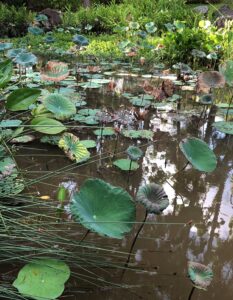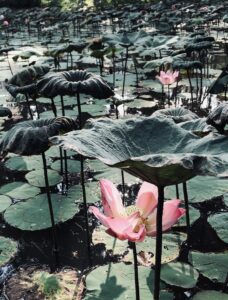 Dear Integral Meditators,
Dear Integral Meditators,
Where is your fundamental wealth and abundance to be found? This weeks article explores this question, and how to develop your connection to your inner resources.
If you enjoy the article, then we will be exploring it in some depth in this week’s Tuesday & Wednesday class, and final reminder for this Saturday’s Zen deep dive-mini retreat!
The thing about your fundamental sensuality is that it feels good, feels positive. It makes your body feel more comfortable, alive and happy. As a result, it is easier for you to direct your thoughts in a positive manner, and generate a variety of enjoyable emotions. Fundamental sensuality also encourages basic reality orientation, in the sense that it places us in contact with the immediate moment, taking us into our body, rather than getting lost in our mind.
Your fundamental warmth & wealth
Once you have some experience of your fundamental vitality or sensuality, you can practice directing its warmth toward yourself. You will discover that this feels friendly and pleasant, and encourages the sense of being both well disposed and supportive toward yourself. Chogyam Trungpa called this our ‘fundamental warmth’. When we focus on ourselves with warmth, it naturally gives rise to self-compassion and sensitivity in a way that encourages healing and integration, rather than wallowing in pain.
Sustainable compassion
With some experience of focusing your fundamental warmth toward yourself, the feeling then starts to come that you are fundamentally wealthy in the inner sense of the word, that you have an abundance of resources. If you then take this warm awareness and vitality and turn it around, then it becomes warmth and natural compassion for others. You feel as if you can generate warmth and compassion for others easily and without much effort, not because you are obliged to, but because you can and it feels quite natural to do so. Moreover, you can focus this warmth and compassion upon others with confidence that it won’t run out, and that if you need a source to recharge yourself from, then you can simply turn your fundamental warmth back toward yourself and receive it for a while. So, this position then gives us real confidence in our capacity to be compassionate and benevolent toward others, without fear of burning out or getting our batteries ‘run down’ by them, even if they are so called ‘energy vampires’ who specialize in using people’s sympathy to take energy from them!
So, the basic practice here has three stages:
- Developing your fundamental sensuality
- Directing it toward yourself to build your fundamental warmth and self-compassion
- Turning your fundamental warmth outward to the world and generating consistent compassion and generosity toward others in a way that is sustainable, and doesn’t lead to exhaustion.
You can build this up gradually, there is no hurry. But the idea is that, over time your energy becomes more and more resilient both intra-personally in your relationship to yourself, and inter-personally in your relationship toward others and the outer world.
Related article: Compassionate presence, awakened action
What is the point in being more present?
Article & content © Toby Ouvry 2022, you are welcome to use or share this article, but please cite Toby as the source and include reference to his website www.tobyouvry.com
 Ongoing – The Way of the Mindful Warrior – Meditating with the Warriors creed
Ongoing – The Way of the Mindful Warrior – Meditating with the Warriors creed
In a sentence: Establish the inner strength, skill and courage needed to make you resilient in the face of life’s challenges, and thrive in both times of adversity and times of peace.
Overview: The Warriors Creed is a poem by an unknown Samurai in the 14th century. It outlines a code of conduct and a state of presence based around a series of inner qualities that can be cultivated through mindful contemplation, then applied to our daily life…read full details
 Saturday 14th April, 9.30am-12noon – Zen meditation deep dive mini-retreatThese 2.5hour Zen ‘mini-retreats’ are a chance to go into much deeper meditation states than you would be able to in your own personal daily practice, or even if you came to a one-hour class. Using sitting meditation methods in combination with breathing techniques and gentle stretching/mobility exercises Toby will guide you into deep meditative flow states that create the experience of a calm, unified, harmonized, resilient body, mind & heart…read full details
Saturday 14th April, 9.30am-12noon – Zen meditation deep dive mini-retreatThese 2.5hour Zen ‘mini-retreats’ are a chance to go into much deeper meditation states than you would be able to in your own personal daily practice, or even if you came to a one-hour class. Using sitting meditation methods in combination with breathing techniques and gentle stretching/mobility exercises Toby will guide you into deep meditative flow states that create the experience of a calm, unified, harmonized, resilient body, mind & heart…read full details
 Saturday May 29th, 9.30-11.30am – Monthly Qi Gong & Taoist Breathwork Clinic & Mini-retreatIn a sentence: Experience unique Qi gong and Taoist breathing techniques to improve your immune system, energy level, psychological wellness and enhance your meditation…read full details
Saturday May 29th, 9.30-11.30am – Monthly Qi Gong & Taoist Breathwork Clinic & Mini-retreatIn a sentence: Experience unique Qi gong and Taoist breathing techniques to improve your immune system, energy level, psychological wellness and enhance your meditation…read full details
Are you looking a coach who can help you to:
- Meet the challenges, stress and changes that you face in a more effective and mindful way
- Become happier within yourself, in your relationships and at work
- Be actively accountable for finding a sense of balance/well-being in your life and fulfilling your personal potential?
- Guide you to find and operate from a deeper sense of meaning, motivation and connectivity in your life?
All upcoming classes and workshops at IMA:
Ongoing – Weekly Tuesday, Wednesday Online class schedule
Ongoing on Wednesday’s, 7.30-8.30pm – Wednesday Meditation for stress transformation and positive energy with Toby (Bukit Timah)
Ongoing on Tuesday evenings, 7.30-8.30pm – Tuesday Meditation for stress transformation and positive energy with Toby (East Coast)
Ongoing – The Way of the Mindful Warrior – Meditating with the Warriors creed
Tues 17th/Weds 18th May: Wesak meditation
Saturday May 29th, 9.30-11.30am – Monthly Qi Gong & Taoist Breathwork Clinic & Mini-retreat
Saturday 14th April, 9.30am-12noon – Zen meditation deep dive mini-retreat
Integral Meditation Asia
Online Courses * 1:1 Coaching * Books * Live Workshops * Corporate Mindfulness Training *Life-Coaching * Meditation Technology

 Dear Integral Meditators,
Dear Integral Meditators, Dear Integral Meditators,
Dear Integral Meditators,


 Dear Integral Meditators,
Dear Integral Meditators,
 Dipping under & dancing within time
Dipping under & dancing within time



